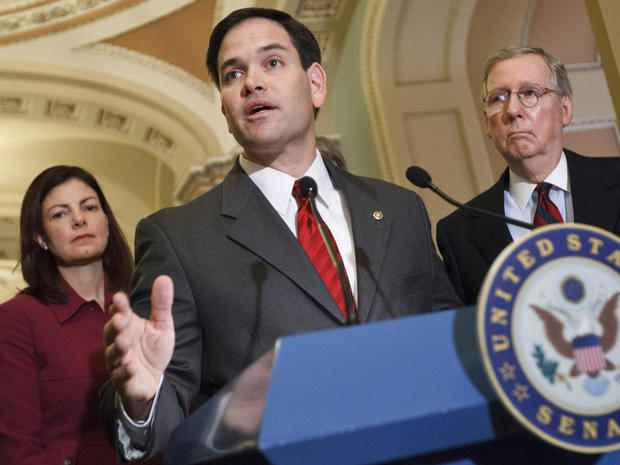Can Mitt Romney fix his Latino problem?
News Analysis
In a closed-door conversationwith top donors that was overheard by a pair of reporters last week, Mitt Romney was blunt: If Republicans can't win over Hispanic voters, it "spells doom for us."
The numbers back that up: Recent polls show President Obama leading Romney among Latinos by more than 40 points. It's an edge that could well mean the difference in Colorado, Nevada, Virginia, Florida and even Arizona - and one that threatens to prevent Romney from keeping Mr. Obama from a second term.
Obama adviser David Axelrod sought to press the advantage Sunday, blaming the lack of comprehensive immigration reform during Mr. Obama's first term on Republican senators who have been dragged to the right by the Tea Party.
Like many of those senators, Romney finds himself in a bind on immigration: He needs to appeal to the largely older, white voters in the GOP base for whom border security is a top issue, but he also needs to keep from alienating the large and growing Latino vote in a way that keeps Latinos squarely in the Democratic fold. (As of the 2010 census, Latinos made up more than 16 percent of the population.) In an apparent effort to put to rest concerns about his moderate record as Massachusetts governor, Romney tacked farther to the right on immigration than he probably would have liked to during the GOP primary. Romney said he would have vetoed the DREAM Act offering children brought to the United States illegally a pathway to citizenship, came out strong against in-state tuition for illegal immigrants and said Arizona's controversial immigration law could be a model for the nation.
It would be a mistake to assume Latino voters only care about immigration - in a recent Pew Hispanic Center poll, just one third of Latinos called immigration an extremely important issue, far fewer than cited jobs and the economy - but there's little question that Romney's hard-line stance, which has been spotlighted on influential Spanish-language television network Univision, hasn't done him any favors with the group.
Romney spent Friday in Arizona, where he met with Hispanic business owners, and he travels today to Pennsylvania to campaign with a huge potential asset: Florida Sen. Marco Rubio. Rubio is widely discussed as a potential vice presidential pick for Romney because he has Tea Party support, he can potentially deliver Florida and, perhaps most importantly, he could send a message to Latinos that they should give Romney and the GOP a second look. (Though Rubio is Cuban-American, unlike the majority of Latinos in the United States, raising the question of whether his potential appeal to Latinos is overstated.)
Rubio has proposed a modified version of the DREAM Act that, without going as far as the Democratic version, would offer nonimmigrant visas to qualified young illegal immigrants that would allow them to eventually apply for citizenship. But while the Romney campaign has already started shifting back to the center on some immigration issues now that the nomination is essentially locked up, Romney has been noncommittal on Rubio's proposal - perhaps out of fear that embracing it will anger a vocal Republican base that sees any path to citizenship as an unacceptable rewarding of illegal behavior. (Romney did reportedly did say his party should offer up a "Republican DREAM Act" during that closed-door fundraiser, but he isn't saying that publicly.)
Even if Romney wants to embrace Rubio's proposal, the untested Florida senator is a gamble as a vice presidential pick who might be seen as less desirable than a safer (and more boring) choice like Rob Portman or Tim Pawlenty. Which is part of the reason that ultimately, Romney may simply have to hope that Latino voters cast ballots in November based on economic issues, not immigration policy. But no matter how things play out in this election, the GOP's Latino image problem isn't going away. And Republicans fear that if they don't change the dynamic soon, the damage could extend far beyond the 2012 election.
